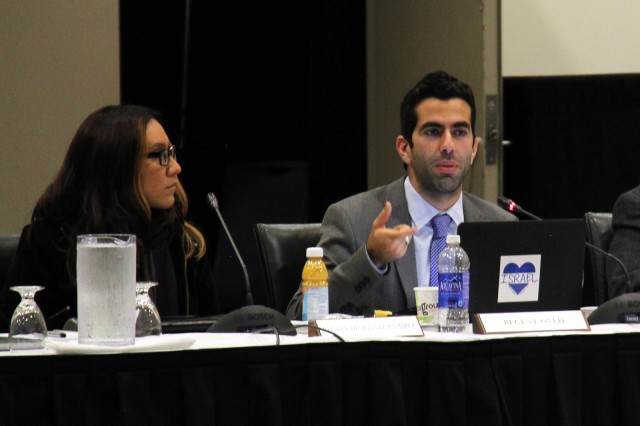What do the UC’s principles against intolerance mean for Zionism?

Student Regent Avi Oved was a part of a working group that wrote the recently passed Statement of Principles Against Intolerance. (Daily Bruin file photo)
By Aram Ghoogasian
March 28, 2016 5:06 p.m.
The University of California Board of Regents finally adopted its long-awaited Statement of Principles Against Intolerance last week after much debate.
If you followed the news at all during the week-long hiatus between the winter and spring quarters, you’d know that Zionism dominated the conversation.
Originally, the Final Report of the Regents Working Group on Principles Against Intolerance stated that anti-Zionism is a form of discrimination that has “no place at the University of California,” a statement that prompted a letter from hundreds of UC faculty members and countless columns from major media outlets. In response, the regents amended the language to read that “anti-Semitic forms of anti-Zionism,” not anti-Zionism as a whole, have no place at the UC. If the board accepted the original statement, the UC would’ve been the first major university system in the country to condemn anti-Zionism outright.
“Anti-Semitic forms of anti-Zionism,” however, is an odd thing to say. Anti-Semitic forms of anti-Zionism are just anti-Semitism. That is to say, “anti-Semitic forms of anti-Zionism” and anti-Semitism writ large are not distinct and separate categories.
This new language, while certainly softer than the original statement, still leaves a good deal of room for interpretation. Many of the concerns people had before the regents convened last week are valid even after the change.
There is no hard and fast way of determining at exactly what point anti-Zionism becomes anti-Semitism, although the two can certainly overlap. Many people say that Zionism is the belief in the self-determination of the Jewish people and their right to a Jewish state in Palestine. But this particular form of ethnic nationalism is mystified in public discourse perhaps more than any other.
Zionism is often treated as an exceptional movement, when it simply isn’t. Just like many other forms of nationalism – it is just nationalism after all – it developed in nineteenth-century Europe and, just like other forms of nationalism, the nation-state is its gold standard.
So to advocate for the unification of Israel and the Palestinian territories to create a binational state with equal rights for all could be considered the denial of the Jewish people’s self-determination as it would end Israel’s status as an exclusively Jewish nation-state.
Millions of Palestinians living in the West Bank, for example, are subject to military occupation. They cannot vote in Israeli elections despite paying taxes to the state and being subject to its laws. On the other hand, Jewish settlers living in the same region do have the right to vote. Granting these Palestinians the right to vote in Israel’s elections is arguably anti-Zionist since it may damage Israel’s Jewish character. Therefore, under this new statement, one could argue that advocating for equal rights for all citizens living in a binational or pluralist state is a form of discrimination since it would reject the idea of Jewish self-determination. Such sentiments hardly seem bigoted to the rational observer, but others may claim they are an attack on Israel’s “right to exist” and are thus an anti-Semitic form of anti-Zionism.
Student Regent Avi Oved complained that the public’s fixation with the mention of Zionism overshadowed the rest of the document. But when Zionism is the only political movement singled out for protection in a document about bigotry, it is the authors themselves who are fixated on Zionism and are giving it preferential treatment. And of course, anything pertaining to Israel and Palestine is an instant lightning rod for debate.
It is also not difficult to see that the board’s insistence on mentioning anti-Zionism by name in the final document was a way to combat the growing call for the UC to divest from companies doing business in occupied Palestine. Tammi Rossman-Benjamin, a lecturer at UC Santa Cruz and the director of the group that led the push for the statement, said as much when she said opposition to Israel within the UC has led to blowback for Jewish students. To think that the attempt to label anti-Zionism as discriminatory would go under the radar, especially at a time when Israel-Palestine has taken center stage in the world of student politics at the UC, is naivety par excellence.
Thankfully, the statement is, according to the UC’s chief lawyer, a statement of opinion and not enforceable policy; the UC isn’t quite Orwellian just yet. Regardless, the idea that the people who govern a major university system can label legitimate discourse as discriminatory is concerning, whether or not it actually stops students and teachers from criticizing or opposing the ethnic nationalist movement known as Zionism. The consequences of such a move are yet to be seen, but it is certain that its critics won’t go quietly.

